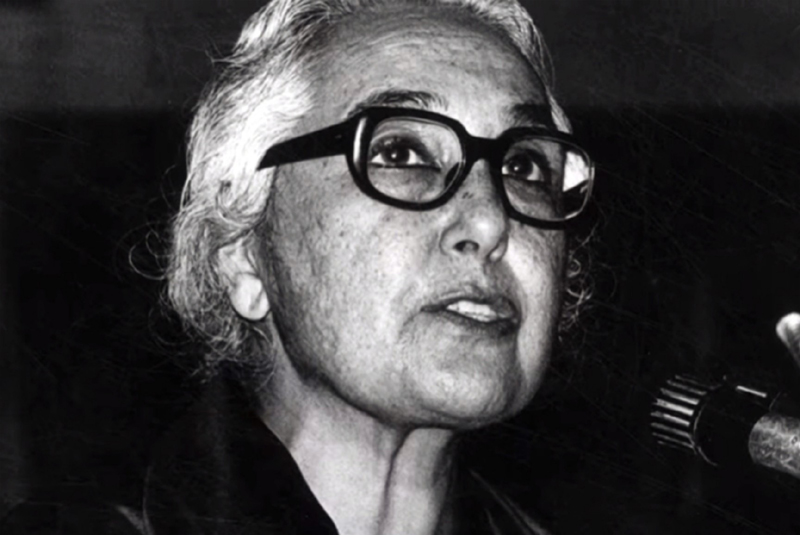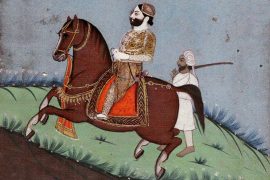History helps us understand what led humanity to its present. It also helps us learn from the mistakes people have committed in the past. The best way to narrate history, then, is to analyse past events and connect them to contemporary issues. Few historians have managed to accomplish this feat with objectivity. Romila Thapar was one of them.
Romila Thapar’s story, like all success stories do, started with a choice. Romila’s father Daya Ram Thapar saved dowry money for her marriage. But the choice was hers–that money would either be used for the wedding or to pursue higher education. She chose education. Today, she is a world renowned historian. And, to this day, she hasn’t married.
Originally, Romila had planned to attend the University of Oxford. However, her application was rejected. Then, she went to SOAS, University of London, from where she earned her PhD in history in 1958. In 196o, she started working as a Reader of Ancient History in Kurukshetra University. From there, she moved to the University of Delhi, where she served as the Reader for over 8 years. Then, she moved to Jawaharlal Nehru University (JNU).
Romila is one of the founding generation of academicians at the JNU. As Professor of Ancient History at the JNU, she created the curriculum for a post-graduate course in history which reflected the true essence of India. Together with her colleagues, she made sure the syllabus was vibrant. Today the Center of Historical Studies in JNU has achieved its fame, rightfully, because of her.
Romila’s Works
As a historian, Thapar emphasised the right to question authority. In her paper “To Question or Not to Question? That is the Question,” she explains how personalities–both in European and Indian history–laid the foundations of the present by asking questions.
Romila’s theoretical construct, based on rigorous evidence from archaeological and archival research, laid the foundations understanding Ancient history through the lens of class struggle. Her work signalled a paradigm shift in the way we understand Ancient Indian history, opened a broad spectrum through which we could comprehend power and authority.
Her ability to narrate history, evidenced by fact, in a dispassionate manner have had a significant impact on our understanding of Ancient India. Some of her works–Aśoka and the Decline of the Mauryas, Ancient Indian Social History: Some Interpretations, Recent Perspectives of Early Indian History, A History of India Volume One, and Early India: From the Origins to AD 13–find a place in most Indian homes.
Recognising her stellar work, the University of Chicago, the University of Oxford, Institut National des Langues et Civilisations Orientales, Paris, the University of Edinburgh, the University of Calcutta, the University of Hyderabad, Brown University, and the University of Pretoria have bestowed her with honorary doctorates.
However, even though Romila Thapar dedicated her life to the study of ancient Indian history, she was on the receiving end of public humiliation earlier this year. When Narendra Modi (whose educational credentials are Prima facie questionable) claimed that Hindus were enslaved by Muslim rulers for a thousand years, Romila Thapar declared it untrue. In response, the Indian government asked her to submit her credentials for re-evaluation. A strange demand, particularly for a renowned scholar who received numerous awards and honorary doctorates from some of the world’s most prestigious universities, and whose work is in the public domain.
Thapar refused to provide her credentials. This is not the first time the BJP or their supporters have come after her. In the past, she criticised the erasure of any proof showing that ancient Indians ate beef in the text books she created. This was in 2001 when the BJP was the ruling party at the centre.
Her book, “Voice of Dissent,” traces the records of dissent against people in power throughout Indian history. In it, Romila Thapar makes her case by saying that the Hinduism we know today would not have been shaped if it wasn’t for people who dissented. It ends with the observations Thapar made in ShaheenBagh, a place where one of the largest protests in history was held. Unsurprisingly, right wing trolls and Hindutva extremists criticised her book as ‘sketchy.’
The trolls’ reaction to Romila Thapar’s work reflects their insecurity and, perhaps, stunted intellectual capabilities. It only shows their unwillingness to accept facts and speak truth to the powers that be.
Romila Thapar has, through her work, inspired a generation of historians to narrate history by following an evidence-based approach in a dispassionate manner. As Romila Thapar celebrates her 90th birthday, in the seventy-fifth year of India’s independence, her scholarly contribution to Indian history remains etched in India’s history.
-30-
Copyright©Madras Courier, All Rights Reserved. You may share using our article tools. Please don't cut articles from madrascourier.com and redistribute by email, post to the web, mobile phone or social media.Please send in your feed back and comments to editor@madrascourier.com











